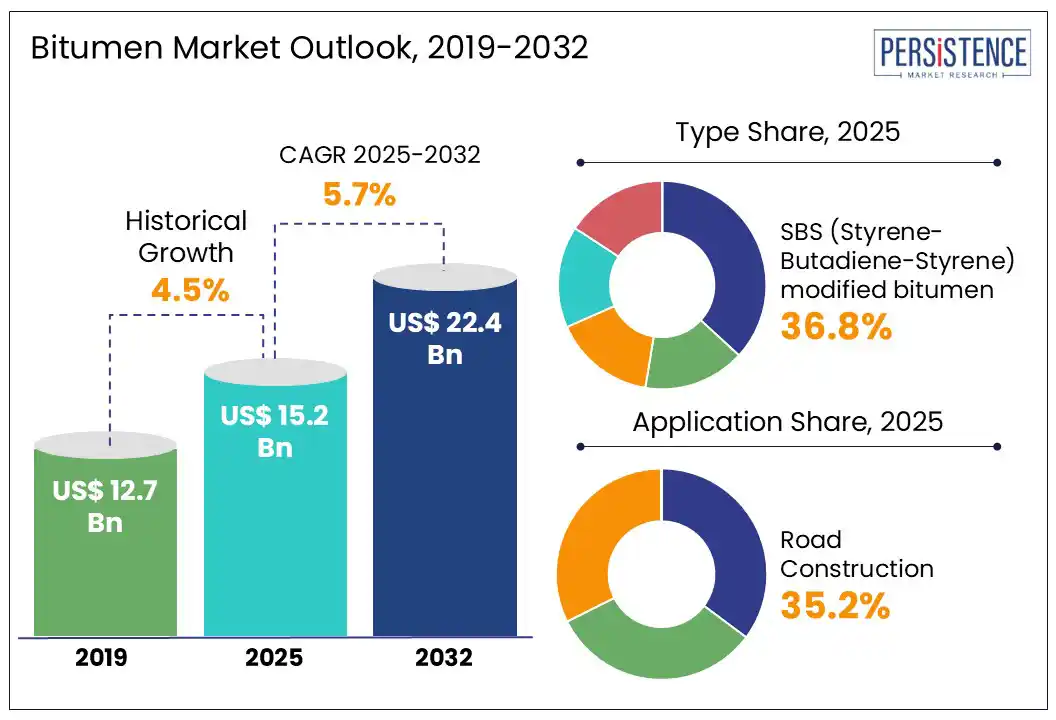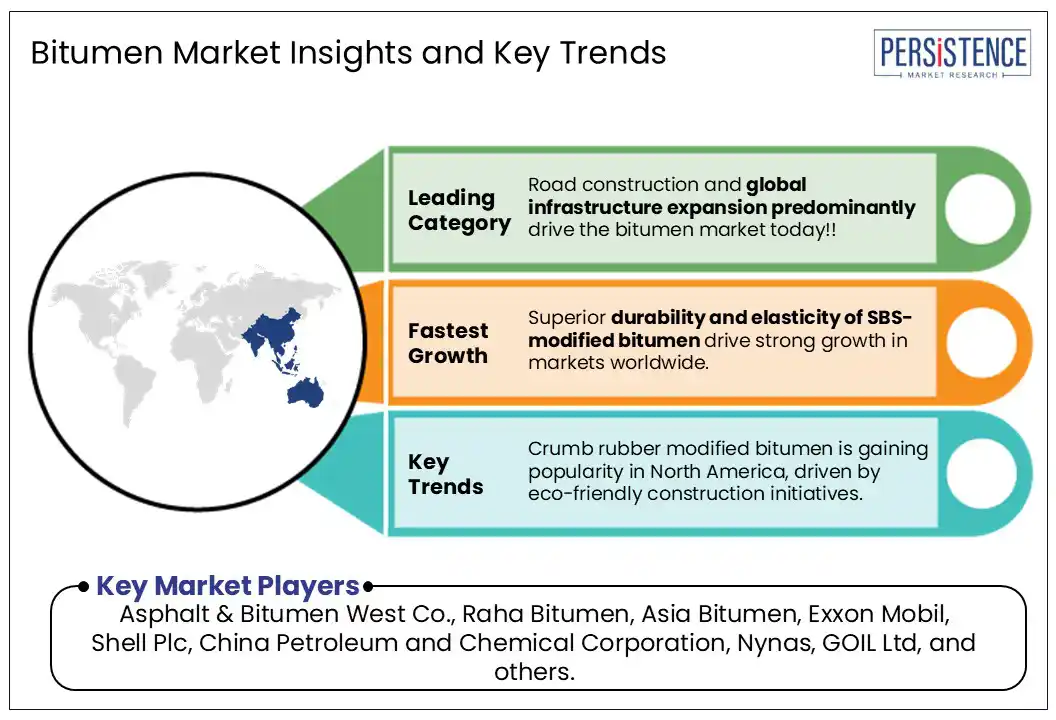ID: PMRREP10721| 198 Pages | 4 Jul 2025 | Format: PDF, Excel, PPT* | Chemicals and Materials

The global bitumen market size is likely to be valued at US$ 15.2 billion in 2025 and is expected to reach US$ 22.4 billion by 2032, growing a CAGR of 5.7% during the forecast period from 2025 to 2032.
The bitumen market is driven by rising infrastructure development, especially road construction and roofing applications. Increasing urbanization, coupled with growing demand for durable and sustainable construction materials, is fueling bitumen consumption. Technological advancements in polymer-modified and eco-friendly bitumen variants are further enhancing market growth across diverse geographic regions and industrial applications.

Key Industry Highlights:
|
Global Market Attribute |
Key Insights |
|
Bitumen Market Size (2025E) |
US$ 15.2 Bn |
|
Market Value Forecast (2032F) |
US$ 22.4 Bn |
|
Projected Growth (CAGR 2025 to 2032) |
5.7% |
|
Historical Market Growth (CAGR 2019 to 2024) |
4.5% |
The global demand for bitumen is strongly driven by ongoing infrastructure expansion and highway development projects. Across regions, large-scale road construction efforts enhance connectivity and stimulate economic growth. Bitumen, valued for its binding and waterproofing properties, is widely used for paving roads, highways, and expressways. This trend is expected to continue as governments and private entities invest in modernizing transportation networks. In 2021, Indian Oil Corporation supplied over 200,000 metric tonnes of bitumen over 90% of what was needed for the 341-km Purvanchal Expressway in Uttar Pradesh. This effort enhanced road durability and reduced CO? emissions by about 3,200 metric tonnes, showcasing the integration of sustainable practices in infrastructure development.
Bitumen production capacity is being significantly restrained by the limited availability of high-quality crude oil, which is essential for producing bitumen with the necessary properties for construction and industrial use. Refiners rely on specific crude grades, and when these are in short supply or inconsistently sourced, bitumen output is negatively affected. Geopolitical tensions and supply chain disruptions have further complicated the accessibility to crude oil, thus complicating the production consistency.
Manufacturers are struggling to meet rising demand, especially in regions that depend on imported crude oil. In such areas, production timelines are being delayed and quality standards often compromised. This supply-side constraint continues to place pressure on the bitumen market, forcing producers to adapt operations and seek alternatives where possible. The situation underscores the broader vulnerability of the bitumen supply chain to global oil dynamics and highlights the need for more resilient sourcing strategies in the face of growing infrastructure demands.
The bitumen market offers promising opportunities through the rising adoption of polymer-modified bitumen (PMB), which is valued for its enhanced durability, elasticity, and resistance to extreme temperatures. These improvements over conventional bitumen have made PMB increasingly preferred for demanding applications such as highways, airports, and roads with heavy traffic. Infrastructure developers are prioritizing PMB for its ability to extend pavement lifespan and minimize maintenance costs.
In 2025, Shell Bitumen launched a low-ageing PMB that reduces asphaltene oxidation, extending its usable life and allowing for recycling into new mixtures. Trials in the UK and the Netherlands have already taken place, with plans for broader application. More than 50% of Shell’s bitumen R&D now focuses on sustainable innovations such as PMB formulation.
The bitumen market continues to be predominantly driven by the road construction segment, supported by widespread infrastructure development efforts worldwide. Governments and private sectors alike are heavily investing in building and upgrading highways, expressways, and urban roads to improves connectivity and stimulate economic growth. Bitumen is widely used as a crucial binder in asphalt mixtures, valued for its ability to deliver durable and smooth road surfaces. As infrastructure projects expand globally, demand for bitumen in road construction remains strong. In 2025, Gazprom Neft’s road construction division modernized transport infrastructure by resurfacing gas stations in 24 regions and advancing road construction technologies in Belarus. These efforts underscore the ongoing demand for high-performance bituminous materials necessary for modern standards of longevity, reliability, and driving comfort.
The bitumen market witnessed a rapid growth in the SBS (Styrene-Butadiene-Styrene) modified segment, largely due to the superior durability and elasticity it offers. SBS modification enhances mechanical strength, enabling bitumen to endure extreme temperature fluctuations and heavy traffic stress. This has made SBS-modified bitumen a preferred choice for high-performance road construction and roofing applications. Its flexibility and resistance to cracking are valued in infrastructure projects where longevity and reliability are essential.
In 2025, Kraton Corporation announced plans to expand its SBS polymer production to meet global demand. The company introduced innovative SBS grades that lower dosages and carbon footprints in bitumen products. Also, Kraton's use of bio-based materials such as pine-derived pitch emphasizes sustainability. These developments showcase the increasing adoption of SBS-modified bitumen for durable infrastructure solutions.

In North America, the U.S. Bitumen Market, a notable shift toward sustainable construction has been marked by the growing adoption of crumb rubber modified bitumen (CRMB). This eco-conscious trend involves the recycling of waste tires into bitumen, significantly enhancing elasticity and crack resistance while addressing the environmental issue of tire waste. Pavement performance has been improved through this approach, and government regulations and incentives have further supported its integration into infrastructure projects.
In 2025, Nynas launched Nypol RE, a polymer-modified bitumen made from renewable materials to lower carbon emissions in road construction. It retains the durability of traditional bitumen while incorporating sustainable alternatives such as lignin from forestry. These developments reflect a broader regional commitment to eco-efficient materials, such as CRMB, supporting North America’s transition toward greener, more resilient infrastructure systems.
In Europe, a strong emphasis is being placed on the use of green and recycled bitumen to meet ambitious sustainability targets. Stricter environmental regulations and policy frameworks are prompting the integration of recycled materials, such as waste asphalt and reclaimed components, into bitumen formulations to lower carbon emissions and preserve natural resources. Advancements in recycling technologies are also being encouraged to enhance the quality and reliability of these eco-friendly materials.
In 2025, Gazprom Neft launched a pilot project in Russia to produce plasticizers from used oils, aimed at reducing environmental impact. The company also introduced a bituminous binder granule blended with secondary cellulose to reduce asphalt rutting, successfully deployed in regions such as Komi, Tatarstan, and Ryazan. Such innovations illustrate Europe’s commitment to circular economy principles and sustainable infrastructure development through the wider adoption of recycled and low-impact bitumen products.
Rapid urbanization and expansion of highway networks have been accelerating the demand for thermoplastic elastomers (TPEs) in bitumen applications in the Asia Pacific. As infrastructure projects are accommodating the growing population and improving regional connectivity, the need for durable, flexible paving materials has become more pronounced. TPEs are adopted for their excellent elasticity and resistance to deformation under diverse climatic conditions. Government investments in smart cities and large-scale transportation infrastructure are further encouraging the use of advanced materials to ensure long-lasting roadways.
In 2025, ExxonMobil highlighted its thermoplastic elastomer innovations at the IDEA 2025 conference. Their Exxtend technology focuses on advanced recycling, promoting sustainable construction by minimizing waste and enhancing bitumen performance. These developments reflect a growing regional shift toward eco-friendly, high-performance materials in infrastructure, aligning with broader sustainability goals.
The global bitumen market is characterized by the presence of several key players who compete by focusing on product innovation, sustainability, and strategic partnerships. Leading companies dominate the landscape by leveraging extensive refining capacities and advanced bitumen modification technologies. These players emphasize the development of polymer-modified and recycled bitumen products to meet evolving infrastructure demands and environmental regulations.
Regional manufacturers cater to local markets by providing cost-effective and customized bitumen solutions. Strategic collaborations, mergers, and acquisitions are frequently pursued to expand product portfolios and geographical reach. Companies invest heavily in R&D to improve bitumen performance in diverse climatic conditions and enhance sustainability, aligning with global green initiatives. The competitive environment is further intensified by the growing demand for eco-friendly bitumen, prompting manufacturers to innovate in recycled and crumb rubber modified bitumen products, securing a competitive edge in this evolving market.
The global Bitumen market is projected to be valued at 15.2 Bn in 2025.
The Bitumen market is driven by increasing global infrastructure and highway development fuels bitumen demand growth.
The Bitumen market is poised to witness a CAGR of 5.7% from 2025 to 2032.
Rising adoption of polymer-modified bitumen offers enhanced performance opportunities is the key market opportunity.
Major players in the Bitumen market include Asphalt & Bitumen West Co., Raha Bitumen, Asia Bitumen, Exxon Mobil, Shell Plc, China Petroleum and Chemical Corporation, Nynas, GOIL Ltd, and others.
|
Report Attribute |
Details |
|
Historical Data/Actuals |
2019 - 2024 |
|
Forecast Period |
2025 - 2032 |
|
Market Analysis Units |
Value: US$ Bn, Volume: Tons |
|
Geographical Coverage |
|
|
Segmental Coverage |
|
|
Competitive Analysis |
|
|
Report Highlights |
|
|
Customization and Pricing |
Available upon request |
By Bitumen Type
By Application
By Region
Delivery Timelines
For more information on this report and its delivery timelines please get in touch with our sales team.
About Author